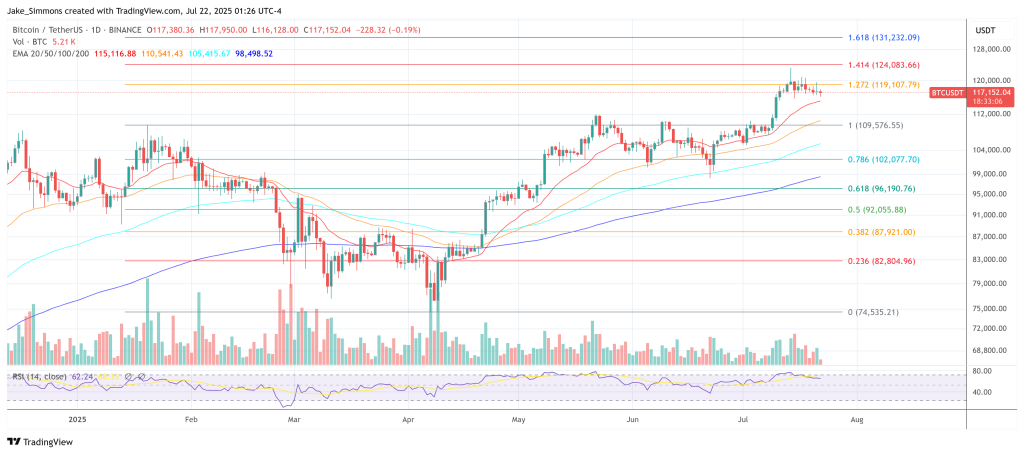Jack Dorsey’s financial technology firm, Block, has unveiled a strategic plan aimed at transforming Bitcoin from a reserve asset into a regular payment method in the U.S. “Paving the way for Bitcoin as a daily currency,” Dorsey shared on X, highlighting a comprehensive blog post and a prior discussion by Thomas Templeton, who leads Bitcoin hardware and mining at Block.
Templeton emphasized the company’s goal of making Bitcoin an everyday currency rather than just a value store, noting that legislative support is crucial. He stated, “To achieve this, we need Congress to update the regulatory landscape,” directing followers to the company’s document, Policies to Unlock Bitcoin as Everyday Money.
3 Steps to Make Bitcoin a Common Currency
The document revisits Bitcoin’s original purpose as envisioned by Satoshi Nakamoto in 2008: a “Peer-to-Peer Electronic Cash System.” Block asserts that Bitcoin’s open, permissionless network is about access rather than speculation and presents BTC’s structure as a template for national payment systems’ resilience and innovation. Block is investing in mining equipment, self-custody wallets, and Square-branded payment systems to reduce entry barriers for individuals and small businesses wishing to use Bitcoin natively.
However, the company argues that federal legislation has lagged behind technological advancements. It urges lawmakers to take three crucial actions for Bitcoin’s broad adoption.
Firstly, Block highlights the need for comprehensive market-structure reform, as outlined in the Digital Asset Market Clarity (CLARITY) Act. Block reaffirms that Bitcoin’s decentralized and open-source nature makes it one of the most transparent and democratically governed monetary systems ever.
Secondly, the company advocates for legal protections for participants who do not hold customer funds, such as software developers, node operators, miners, and wallet providers, echoing the bipartisan Blockchain Regulatory Certainty Act. This act would clarify that money-transmission regulations apply only to intermediaries controlling customer funds.
Lastly, Block calls for a de minimis capital-gains exemption on minor transactions, likening Bitcoin’s tax treatment to foreign currency. Current regulations mean using appreciated BTC for small purchases, like coffee, triggers a taxable event, which Block argues discourages everyday use. The company notes that Square plans to facilitate direct BTC payments later this year and asserts that tax relief is crucial for Bitcoin’s broader adoption as a transaction medium.
Throughout the policy paper, Block distinguishes Bitcoin from other digital assets by highlighting its fixed supply of 21 million coins, its “fungibility,” and its over-decade-long operational history. The memo states, “Whether transferring value internationally or seamlessly conducting transactions with small businesses, Bitcoin has the potential to modernize payments and address everyday financial needs.”
While Dorsey’s support for Bitcoin is well-documented—once calling it “the native currency of the internet”—Block’s new roadmap is the company’s most detailed policy strategy yet. Since its release, legislative dynamics have shifted: the Digital Asset Market Clarity (CLARITY) Act passed the House on July 17 with a 294–134 vote and is now pending in the Senate.
Conversely, the more limited Blockchain Regulatory Certainty Act has been reintroduced but remains stalled in the House Financial Services Committee, with no corresponding Senate bill yet. Observers are keen to see if Senate Banking Chair Tim Scott will advance CLARITY following a committee hearing on digital asset market structure on July 9, and whether tax legislation will include a de minimis capital-gains exemption, especially after President Trump signed the GENIUS stablecoin law on July 21.
Without these reforms, Block cautions that the U.S. risks falling behind other regions where Bitcoin payments are already mainstream. As Square’s merchant network prepares to accept Bitcoin alongside credit cards and Tap-to-Pay, the company’s message to lawmakers is clear: “It’s time for Congress to establish a comprehensive federal licensing framework and remove tax barriers for small-scale BTC transactions to become a viable exchange medium.”
At the time of this report, BTC was valued at $117,152.











